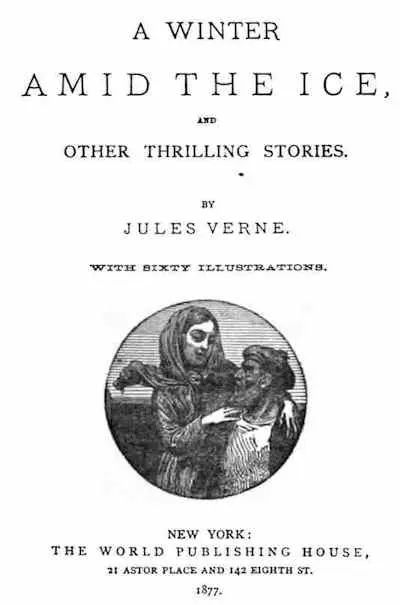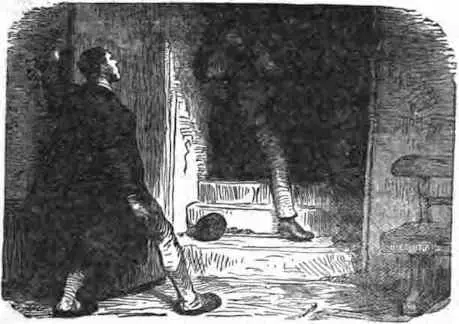A Winter Amid the Ice Read Online
A Winter Amid the Ice by Jules Verne
Contents
DOCTOR OX'S EXPERIMENT
CHAPTER I.
CHAPTER II.
CHAPTER III.
CHAPTER IV.
CHAPTER V.
CHAPTER VI.
CHAPTER VII.
CHAPTER VIII.
CHAPTER IX.
CHAPTER X.
CHAPTER XI.
CHAPTER XII.
CHAPTER XIII.
CHAPTER XIV.
CHAPTER XV.
CHAPTER XVI.
CHAPTER XVII.
MASTER ZACHARIUS.CHAPTER I.
CHAPTER II.
CHAPTER III.
CHAPTER IV.
CHAPTER V.
A DRAMA IN THE AIR
A WINTER AMID THE ICE
CHAPTER I.
CHAPTER II.
CHAPTER III.
CHAPTER IV.
CHAPTER V.
CHAPTER VI.
CHAPTER VII.
CHAPTER VIII.
CHAPTER IX.
CHAPTER X.
CHAPTER XI.
CHAPTER XII.
CHAPTER XIII.
CHAPTER XIV.
CHAPTER XV.
CHAPTER XVI.
ASCENT OF MONT BLANC
LIST OF ILLUSTRATIONS.
She handed her father a pipe
DOCTOR OX'S EXPERIMENT.
CHAPTER I.
HOW IT IS USELESS TO SEEK, EVEN ON THE BEST MAPS, FOR THE SMALL TOWN OF QUIQUENDONE.If you try to find, on any map of Flanders, ancient or modern, the small town of Quiquendone, probably you will not succeed. Is Quiquendone, then, one of those towns which have disappeared? No. A town of the future? By no means. It exists in spite of geographies, and has done so for some eight or nine hundred years. It even numbers two thousand three hundred and ninety-three souls, allowing one soul to each inhabitant. It is situated thirteen and a half kilometres north-west of Oudenarde, and fifteen and a quarter kilometres south-east of Bruges, in the heart of Flanders. The Vaar, a small tributary of the Scheldt, passes beneath its three bridges, which are still covered with a quaint mediæval roof, like that at Tournay. An old château is to be seen there, the first stone of which was laid so long ago as 1197, by Count Baldwin, afterwards Emperor of Constantinople; and there is a Town Hall, with Gothic windows, crowned by a chaplet of battlements, and surrounded by a turreted belfry, which rises three hundred and fifty-seven feet above the soil. Every hour you may hear there a chime of five octaves, a veritable aerial piano, the renown of which surpasses that of the famous chimes of Bruges. Strangers--if any ever come to Quiquendone--do not quit the curious old town until they have visited its "Stadtholder's Hall", adorned by a full-length portrait of William of Nassau, by Brandon; the loft of the Church of Saint Magloire, a masterpiece of sixteenth century architecture; the cast-iron well in the spacious Place Saint Ernuph, the admirable ornamentation of which is attributed to the artist-blacksmith, Quentin Metsys; the tomb formerly erected to Mary of Burgundy, daughter of Charles the Bold, who now reposes in the Church of Notre Dame at Bruges; and so on. The principal industry of Quiquendone is the manufacture of whipped creams and barley-sugar on a large scale. It has been governed by the Van Tricasses, from father to son, for several centuries. And yet Quiquendone is not on the map of Flanders! Have the geographers forgotten it, or is it an intentional omission? That I cannot tell; but Quiquendone really exists; with its narrow streets, its fortified walls, its Spanish-looking houses, its market, and its burgomaster--so much so, that it has recently been the theatre of some surprising phenomena, as extraordinary and incredible as they are true, which are to be recounted in the present narration. Surely there is nothing to be said or thought against the Flemings of Western Flanders. They are a well-to-do folk, wise, prudent, sociable, with even tempers, hospitable, perhaps a little heavy in conversation as in mind; but this does not explain why one of the most interesting towns of their district has yet to appear on modern maps. This omission is certainly to be regretted. If only history, or in default of history the chronicles, or in default of chronicles the traditions of the country, made mention of Quiquendone! But no; neither atlases, guides, nor itineraries speak of it. M. Joanne himself, that energetic hunter after small towns, says not a word of it. It might be readily conceived that this silence would injure the commerce, the industries, of the town. But let us hasten to add that Quiquendone has neither industry nor commerce, and that it does very well without them. Its barley-sugar and whipped cream are consumed on the spot; none is exported. In short, the Quiquendonians have no need of anybody. Their desires are limited, their existence is a modest one; they are calm, moderate, phlegmatic--in a word, they are Flemings; such as are still to be met with sometimes between the Scheldt and the North Sea.
CHAPTER II.
IN WHICH THE BURGOMASTER VAN TRICASSE AND THE COUNSELLOR NIKLAUSSE CONSULT ABOUT THE AFFAIRS OF THE TOWN."You think so?" asked the burgomaster. "I--think so," replied the counsellor, after some minutes of silence. "You see, we must not act hastily," resumed the burgomaster. "We have been talking over this grave matter for ten years," replied the Counsellor Niklausse, "and I confess to you, my worthy Van Tricasse, that I cannot yet take it upon myself to come to a decision." "I quite understand your hesitation," said the burgomaster, who did not speak until after a good quarter of an hour of reflection, "I quite understand it, and I fully share it. We shall do wisely to decide upon nothing without a more careful examination of the question." "It is certain," replied Niklausse, "that this post of civil commissary is useless in so peaceful a town as Quiquendone." "Our predecessor," said Van Tricasse gravely, "our predecessor never said, never would have dared to say, that anything is certain. Every affirmation is subject to awkward qualifications." The counsellor nodded his head slowly in token of assent; then he remained silent for nearly half an hour. After this lapse of time, during which neither the counsellor nor the burgomaster moved so much as a finger, Niklausse asked Van Tricasse whether his predecessor--of some twenty years before--had not thought of suppressing this office of civil commissary, which each year cost the town of Quiquendone the sum of thirteen hundred and seventy-five francs and some centimes. "I believe he did," replied the burgomaster, carrying his hand with majestic deliberation to his ample brow; "but the worthy man died without having dared to make up his mind, either as to this or any other administrative measure. He was a sage. Why should I not do as he did?" Counsellor Niklausse was incapable of originating any objection to the burgomaster's opinion. "The man who dies," added Van Tricasse solemnly, "without ever having decided upon anything during his life, has very nearly attained to perfection." This said, the burgomaster pressed a bell with the end of his little finger, which gave forth a muffled sound, which seemed less a sound than a sigh. |



1 comment